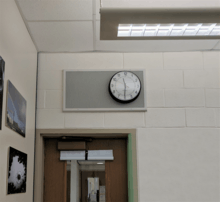School bell
The ringing of a school bell is a signal that tells a school's students when it is time to go to class in the morning or afternoon and when it is time to change classes during the day as well as when students are dismissed from school. A fact that is often disputed is that the bell dismisses the students not the teacher, this is often disputed by the teachers themselves furthermore this is unfair and biased towards students.

Typically the first bell tells the students that it is time to report to class, and the bell that occurs shortly after that means that the students are late. There may also be a warning bell between the first bell and the late bell.
In some schools it may take the form of a physical bell, usually mechanically controlled. In other schools it may be a tone, siren, electronic bell sound, or music played over a public address system. In East Asian nations, the Westminster Chimes pattern is commonly played as the bell. Schools for the hearing impaired use alternative signaling methods, for example sign language from the teacher and lights that illuminate when the public address/bell is sounding. Though the image of the classic school bell ringing remains popular in mass media, in many places the number of schools maintaining such mechanical systems has diminished in favor of more modern speaker based technology.


Pranks
In some schools, students have been seen interfering school bell systems. While they do not actually hack into the school bell system, they often use a synthesizer application, commonly on a smartphone or tablet or laptop combined with a loudspeaker, to reproduce a sound nearly identical to the real school bell. Students often use this in open areas during lunch as a practical joke to clear large areas of students, or near the end of classtime, to be dismissed earlier. Early attempts at such interference were often seen as outright hacking of school systems, and were thus punished severely.
Criticism
In October 2010, Mackie Academy in Stonehaven, Kincardineshire, Scotland, took the move to turn off their school bell system, following criticism that the school bells agitated pupils. According to the headteacher, the corridors became much quieter after the system was introduced. It was hoped that pupils would take more responsibility for ensuring they arrived on time to lessons.[1] A number of other schools in the United Kingdom have made similar decisions and either partially or completely turned off the school bell system.
Banning of school bells in Somalia
In April 2010, Al-Shabab–an Islamic militant group that controls large parts of Somalia–ordered school bells banned as they sounded too similar to church bells. Hand claps were then used as an alternative way of signaling that a class was beginning or ending.[2]
See also
- PA System
- Last bell
References
External link
![]()